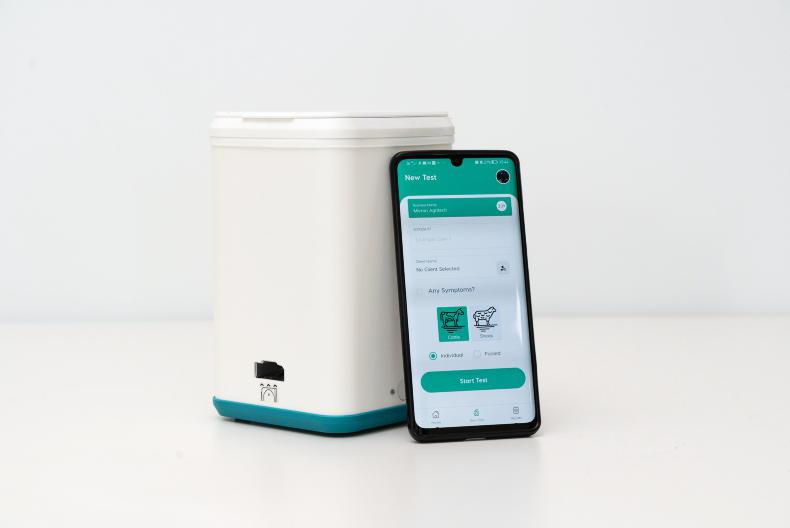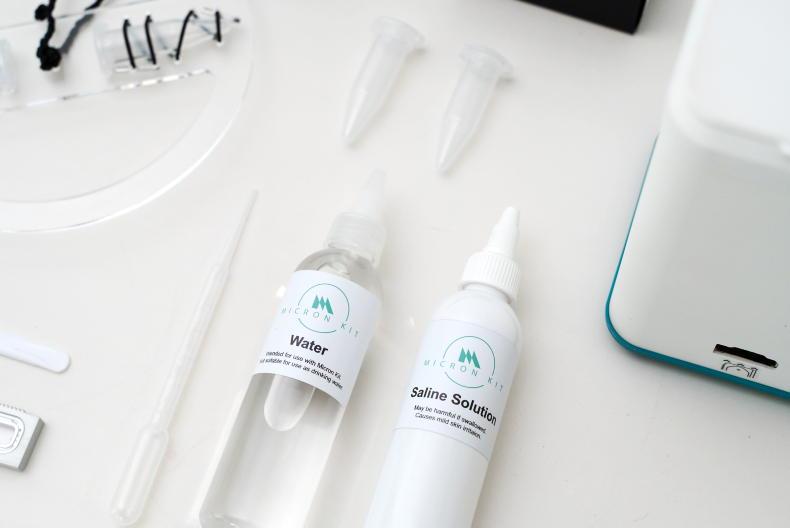Dublin-based Micron Agritech was founded in 2019 and is set to become a key player in the global animal health industry.
The company has developed an innovative on-farm parasite testing kit for animals that delivers rapid results through a mobile phone.
The company comes from humble beginnings, having started as a college project between four classmates studying product design in Dublin Institute of Technology (now TU Dublin).
In week two of our Enterprise Ireland innovation series, we caught up with Micron Agritech CEO Daniel Izquierdo Hijazi to learn more.
In year three of the course, Daniel and his three teammates, Tara McElligott, Sean Smith and Jose Lopez Escobar, were tasked with designing a solution to solve a major world problem which they had to identify.
Testing process
The idea for the kit was born when team member Jose learnt of a vet’s frustration at the current animal parasite testing process.
The vet had to send faecal samples to a lab for testing and the results of the egg count could take up to five days to come back. Due to the delay, in some cases antiparasitics were administered to the animals without confirmation that parasites were present. In turn, this risked the development of antiparasitic resistance.
As the EU was set to ban blanket dosing of animals for parasites without evidence this year, the team spotted an opportunity for a rapid testing and diagnostic kit and spent much of the third year researching the feasibility and proving the concept of the idea.
While none of the founders have direct experience in farming, after a visit to the National Ploughing Championships and engagement with the industry, it soon became apparent that their idea had the potential to be a game-changer.
By the end of the semester, the team had filed their first patent for the system and by semester two they had successfully secured Enterprise Ireland competitive start funding to the tune of €50,000. This was used to further research the market, refine the concept and make basic prototypes.
Work around the project intensified in the fourth year and during their final exams, they successfully secured €500,000 in seed funding from animal health company Bimeda, agritech venture capital fund The Yield Lab Europe and Enterprise Ireland. They were then able to dedicate themselves full-time to the project and expand the team.
Development
Prototype development really began during the Covid-19 pandemic. However, efforts ramped up considerably when they moved into their office in Grangegorman which contains a rapid prototyping lab, explains Daniel.
“We would develop a piece of equipment, test it, make amendments and repeat that process,” explained Daniel.

The Micron kit.
Over the development process, the design changed considerably.
“Initially, we were trying to develop a fully independent system, with a camera and computer in a single device. But we then came to the realisation that everything we were trying to do already exists in the user’s pocket in their mobile phone,” explains Daniel.
“So we shifted the focus to making a device powered by a phone, making the technology less complex and more accessible,” he says.
End product
The end product now consists of a reader on which a mobile phone with a camera can be placed on top. The slide with a sample is placed in the reader where it is magnified under a microscope. The phone camera then takes over 5,000 images of the sample.

Testing components which come with the Micron kit.
This data is compressed and uploaded to their servers where an algorithm can detect the presence of parasite eggs and determine the type of egg.
The software then counts the number of eggs in the image to calculate the level of infection and in under 30 minutes, the user receives a simple PDF file with the results. The results from the testing kit are as accurate as a lab-based analysis, explains Daniel.
While the kit is largely designed for use by vets, it can also be used by farmers.
Once the kit its purchased, users subscribe to the cloud service. The product is manufactured in Clare using high-quality materials to ensure that the product is durable.
The slides themselves are made from aluminium meaning they can be reused.
Earlier this year, they were successful in securing €1.5m in funding from The Yield Lab Europe, Investbridge Capital, Centenary Thurles, Enterprise Ireland and EIT Food.
This funding is being used to produce their first batch of the product for sale. They now aim to continue to grow in Ireland while also expanding to global markets.
Innovation awards
In September, the team picked up an Enterprise Ireland innovation award for the overall startup and animal health category. The award was for the expansion of the Micron kit platform for analysis of liver fluke which will be launched next year.
Daniel encourages all readers to avail of the targeted advisory service on animal health (TASAH) scheme which is run by Animal Health Ireland.
This scheme funds a free veterinary visit and includes two free faecal egg count.
This fully funded service is available to all cattle and sheep farmers in Ireland.
Name: Micron Agritech.Directors: Tara McElligott, Sean Smith, Jose Lopez Escobar and Daniel Izquierdo Hijazi.Location: Dublin. Founded: 2019. Employees: 15.
Dublin-based Micron Agritech was founded in 2019 and is set to become a key player in the global animal health industry.
The company has developed an innovative on-farm parasite testing kit for animals that delivers rapid results through a mobile phone.
The company comes from humble beginnings, having started as a college project between four classmates studying product design in Dublin Institute of Technology (now TU Dublin).
In week two of our Enterprise Ireland innovation series, we caught up with Micron Agritech CEO Daniel Izquierdo Hijazi to learn more.
In year three of the course, Daniel and his three teammates, Tara McElligott, Sean Smith and Jose Lopez Escobar, were tasked with designing a solution to solve a major world problem which they had to identify.
Testing process
The idea for the kit was born when team member Jose learnt of a vet’s frustration at the current animal parasite testing process.
The vet had to send faecal samples to a lab for testing and the results of the egg count could take up to five days to come back. Due to the delay, in some cases antiparasitics were administered to the animals without confirmation that parasites were present. In turn, this risked the development of antiparasitic resistance.
As the EU was set to ban blanket dosing of animals for parasites without evidence this year, the team spotted an opportunity for a rapid testing and diagnostic kit and spent much of the third year researching the feasibility and proving the concept of the idea.
While none of the founders have direct experience in farming, after a visit to the National Ploughing Championships and engagement with the industry, it soon became apparent that their idea had the potential to be a game-changer.
By the end of the semester, the team had filed their first patent for the system and by semester two they had successfully secured Enterprise Ireland competitive start funding to the tune of €50,000. This was used to further research the market, refine the concept and make basic prototypes.
Work around the project intensified in the fourth year and during their final exams, they successfully secured €500,000 in seed funding from animal health company Bimeda, agritech venture capital fund The Yield Lab Europe and Enterprise Ireland. They were then able to dedicate themselves full-time to the project and expand the team.
Development
Prototype development really began during the Covid-19 pandemic. However, efforts ramped up considerably when they moved into their office in Grangegorman which contains a rapid prototyping lab, explains Daniel.
“We would develop a piece of equipment, test it, make amendments and repeat that process,” explained Daniel.

The Micron kit.
Over the development process, the design changed considerably.
“Initially, we were trying to develop a fully independent system, with a camera and computer in a single device. But we then came to the realisation that everything we were trying to do already exists in the user’s pocket in their mobile phone,” explains Daniel.
“So we shifted the focus to making a device powered by a phone, making the technology less complex and more accessible,” he says.
End product
The end product now consists of a reader on which a mobile phone with a camera can be placed on top. The slide with a sample is placed in the reader where it is magnified under a microscope. The phone camera then takes over 5,000 images of the sample.

Testing components which come with the Micron kit.
This data is compressed and uploaded to their servers where an algorithm can detect the presence of parasite eggs and determine the type of egg.
The software then counts the number of eggs in the image to calculate the level of infection and in under 30 minutes, the user receives a simple PDF file with the results. The results from the testing kit are as accurate as a lab-based analysis, explains Daniel.
While the kit is largely designed for use by vets, it can also be used by farmers.
Once the kit its purchased, users subscribe to the cloud service. The product is manufactured in Clare using high-quality materials to ensure that the product is durable.
The slides themselves are made from aluminium meaning they can be reused.
Earlier this year, they were successful in securing €1.5m in funding from The Yield Lab Europe, Investbridge Capital, Centenary Thurles, Enterprise Ireland and EIT Food.
This funding is being used to produce their first batch of the product for sale. They now aim to continue to grow in Ireland while also expanding to global markets.
Innovation awards
In September, the team picked up an Enterprise Ireland innovation award for the overall startup and animal health category. The award was for the expansion of the Micron kit platform for analysis of liver fluke which will be launched next year.
Daniel encourages all readers to avail of the targeted advisory service on animal health (TASAH) scheme which is run by Animal Health Ireland.
This scheme funds a free veterinary visit and includes two free faecal egg count.
This fully funded service is available to all cattle and sheep farmers in Ireland.
Name: Micron Agritech.Directors: Tara McElligott, Sean Smith, Jose Lopez Escobar and Daniel Izquierdo Hijazi.Location: Dublin. Founded: 2019. Employees: 15. 







 This is a subscriber-only article
This is a subscriber-only article










SHARING OPTIONS: